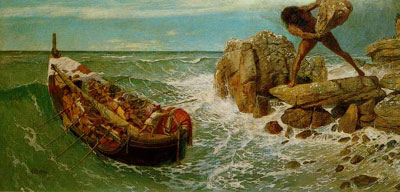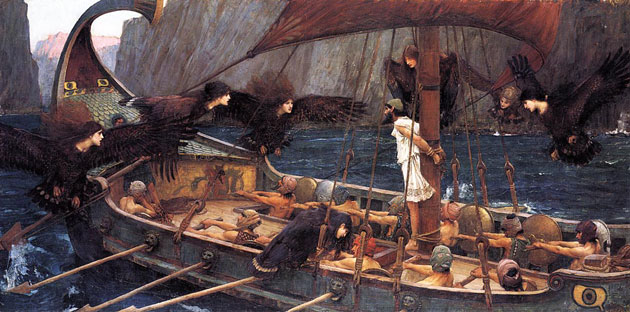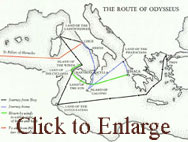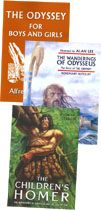Sometimes it's hard to tell what The Odyssey is, exactly: an action novel, a horror story, a romance? One thing is for sure: like all great literature, it's about homecoming. Whether it's the Israelites yearning for Zion, Aeneas building Rome, Ishmael returning to sea, or the Joads migrating to California, the best stories are about being lost and finding your way back....or simply putting down roots wherever you end up.
The idea that there's something inherently good about home isn't taken for granted anymore. People used to believe their identity came from their family, their faith, and their nationality. Now, everyone assumes their identity is something they have to invent themselves, regardless of their past. They call this "being authentic," though in reality it's just being self-absorbed. This wasn't the case in the ancient world.
Back then, you were never a free agent. Self-identity wasn't something anyone questioned because they knew who they were and acted accordingly. Which family were you from, who you worshipped, where you lived, and how you survived all worked together to determine who you were. People accepted this, and it made life a lot more simple and less dramatic. This is the world in which Homer composed The Odyssey, and we have to understand this context if we hope to make sense of his epic.
The Odyssey is named for its hero, Odysseus (also called Ulysses), and describes his struggle to get home ten years after the ten-year Trojan War. Odysseus is the Greek king of Ithaca; he has a beautiful wife named Penelope and a 20-year-old son named Telemachus, both of whom await Odysseus in his palace. A bunch of Telly's friends hang out with them, trying to marry Penny, eating Odysseus' food and spending his money. Odysseus is unaware, but wants to get home anyway.
 Or does he? His wanderings, adventures, and exploits are a bit confusing at times. Some of the setbacks are beyond his control, like the incidents with the Cyclops, the Lotus-Eaters, and Scylla and Charybdis. But others are definitely the result of Odysseus' humanity, including multiple affairs with women and goddesses. Still, we can recognize that Odysseus really wants to get home, even though he sometimes gets off-track.
Or does he? His wanderings, adventures, and exploits are a bit confusing at times. Some of the setbacks are beyond his control, like the incidents with the Cyclops, the Lotus-Eaters, and Scylla and Charybdis. But others are definitely the result of Odysseus' humanity, including multiple affairs with women and goddesses. Still, we can recognize that Odysseus really wants to get home, even though he sometimes gets off-track.
Why is he so anxious to get home, and how can we tell? If we understand the ancient worldview of heroes like Odysseus, the answer is pretty obvious: he wants to get home because that's where he can embrace his true identity most fully. Throughout The Odyssey, Odysseus is forced to adopt different disguises in order to stay alive. Even in Ithaca, when he first gets back, he's dressed like an old man. Fully restored as King of Ithaca, however, he is completely Odysseus, and so completely free.
Don't think this is just another boring philosophical essay, though. The Odyssey is full of wild adventures, fights with monsters and other humans, beautiful women, strong men, humor, and heroics. Because this is another thing the ancients understood, and that we have forgotten: the absolute flesh-and-blood color, passion and joy of life. As G. K. Chesterton attested, an adventure story is no adventure story without sword fights. In this sense, The Odyssey is one of the best.
Review by C. Hollis Crossman
C. Hollis Crossman used to be a child. Now he's a husband and father who loves church, good food, and weird stuff. He might be a mythical creature, but he's definitely not a centaur. Read more of his reviews
here.

About the Translations:

 Historians assume The Odyssey was written around 800 B.C. Passed down orally, many scholars believe it originated with one single man. However, some believe that “Homer” was a common name for blind travelers who made a living wandering around Greece reciting poetry. Though we no longer live in a storytelling culture, over the years countless translators have given us their own versions of The Odyssey—varying in style, tone and length. Over 60 complete English translations exist today (see a mostly complete list here).
Historians assume The Odyssey was written around 800 B.C. Passed down orally, many scholars believe it originated with one single man. However, some believe that “Homer” was a common name for blind travelers who made a living wandering around Greece reciting poetry. Though we no longer live in a storytelling culture, over the years countless translators have given us their own versions of The Odyssey—varying in style, tone and length. Over 60 complete English translations exist today (see a mostly complete list here).
We currently carry six translations here at Exodus Books. Two are prose versions, and the rest are in poetic form. (Click here to view an exclusive comparison chart which features five selections from the poem.)
The two prose versions are by Samuel Butler (1990) and W.H.D. Rouse (1937). Butler's version is used by the Memoria Press study guides and the SMARR student literature companions. This version is in public domain and can be read online for free. Rouse’s version, not used by any curriculum that we know of, is a more recent novelized Odyssey.
Richmond Lattimore's 1965 translation is set in 6 beat lines (hexameter). One professor at Middlebury College praises Lattimore for "writing in a compact and cautiously rich poetical style but without fussiness." Veritas Press uses this version in their Omnibus I program.
Robert Fitzgerald's 1961 Odyssey is unrhymed poetry with lines of irregular length. D. S. Carne-Ross, in his introduction to Fitzgerald's Odyssey, praises the translator for taking certain liberties with the text, while still staying faithful to the Greek. Instead of rigidly ahering to the methods of the Homeric purists, Fitzgerald was more concerned with communicating to modern readers the action and emotion found in The Odyssey. None of the curricula here at Exodus requires this version, but we carry it because it is a solid, well-respected translation used by many teachers.
 Robert Fagles tries to concentrate on the "voices" in his Odyssey (1996), believing that readers should hear Homer in their heads and not just process words on paper. Fagles himself was a poet, and his deep appreciation for British and American poetry helped shape his vision for his unrhymed verse Odyssey. Peter Leithart favors this translation in his Heroes of the City of Man, an excellent Christian introduction to the ancient classics. One note: Fagles' line numbering does not correspond with the Greek line numbers. Fortunately for readers studying classical Greek, Fagles chose to put the line numbers of the Greek text in parentheses at the top of each page.
Robert Fagles tries to concentrate on the "voices" in his Odyssey (1996), believing that readers should hear Homer in their heads and not just process words on paper. Fagles himself was a poet, and his deep appreciation for British and American poetry helped shape his vision for his unrhymed verse Odyssey. Peter Leithart favors this translation in his Heroes of the City of Man, an excellent Christian introduction to the ancient classics. One note: Fagles' line numbering does not correspond with the Greek line numbers. Fortunately for readers studying classical Greek, Fagles chose to put the line numbers of the Greek text in parentheses at the top of each page.
Emily Wilson is the first woman (we know of) to publish the Odyssey in English. Matching the number of lines in the Greek original, and using iambic pentameter with vivid, contemporary idiom, her translation is punchy and robust. The book includes a fascinating introduction that explores the epic's background and major themes, the controversies about its origins, and the unparalleled scope of its impact and influence. It includes three maps drawn especially for this volume, a pronunciation glossary, and extensive notes and summaries of each book, and the formatting of the text is really appealing.
There are plenty of other translations of The Odyssey, and it will likely remain a favorite translation project of Greek scholars for centuries to come. Whichever version you choose to read, we hope you'll enjoy the epic story.
Children's Versions:
 If you're hoping to introduce your younger students to The Odssey, we recommend starting with an adaptation for children. We have four that we believe are excellent. The Odyssey for Boys and Girls, by Alfred J. Church, is one such option. Church's book is a solid, literary retelling of the Odyssey, and covers most of the adventures found in the original. It also includes a few black-and-white illustrations. This version was written in the late 19th century and has the advantage of being available online for free.
If you're hoping to introduce your younger students to The Odssey, we recommend starting with an adaptation for children. We have four that we believe are excellent. The Odyssey for Boys and Girls, by Alfred J. Church, is one such option. Church's book is a solid, literary retelling of the Odyssey, and covers most of the adventures found in the original. It also includes a few black-and-white illustrations. This version was written in the late 19th century and has the advantage of being available online for free.
Padraic Colum’s Children’s Homer combines stories from The Iliad and The Odyssey into one book. Written during the 1940s, this version is a little more accessible and also available online. Includes delightful pen-and-ink illustrations by Will Pogany. Colum spends the first part of the book retelling how how Odysseus' son Telemachus went on a voyage and heard the tale of Troy from Menelaus and Helen. The second part details Odysseus' travels and his triumph over the wicked suitors when he returns home.
We also carry Rosemary Sutcliff’s Wanderings of Odysseus, which is an excellent rendering of the Odyssey for kids. We carry two versions of this book, an inexpensive paperback and an incredible hardcover, lavishly illustrated by Alan Lee (of Lord of the Rings fame). Lee's watercolor illlustrations are elegantly haunting and perfectly convey the mood of the text. Sutcliff has achieved a perfect balance with her adaption: classic while still fresh. Buy this book as a bed-time read aloud and it will last you a long time. You won't regret it.
Lastly, we carry a Puffin abridged Odyssey, retold by Geraldine McCaughrean.
Did you find this review helpful?